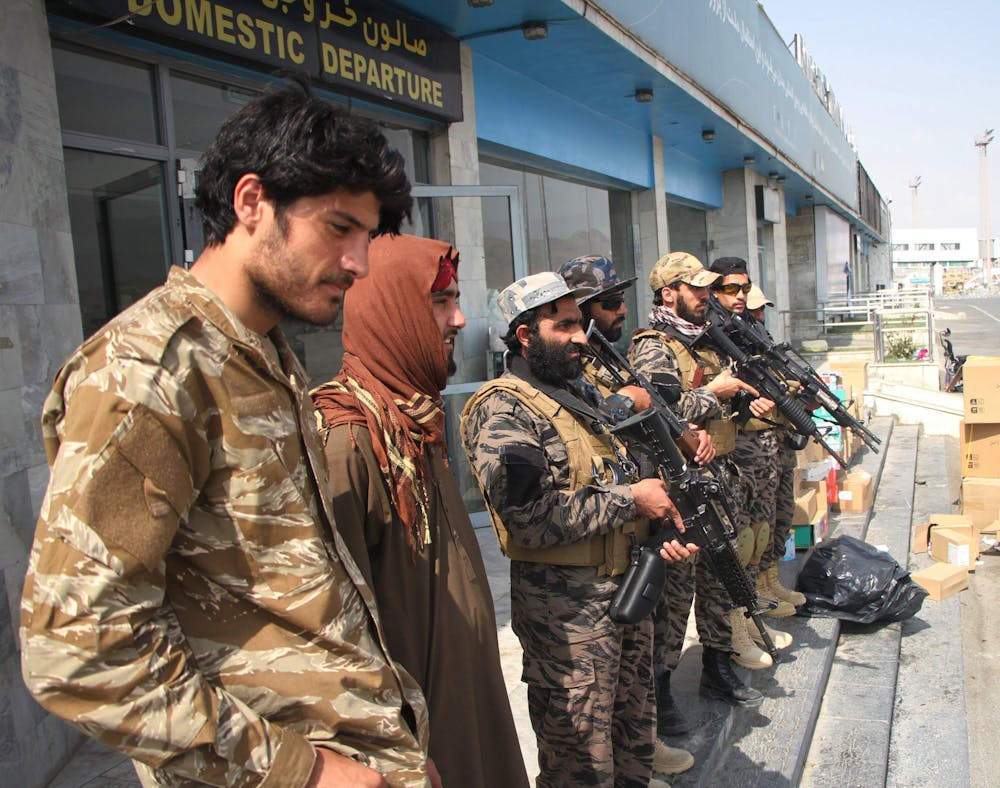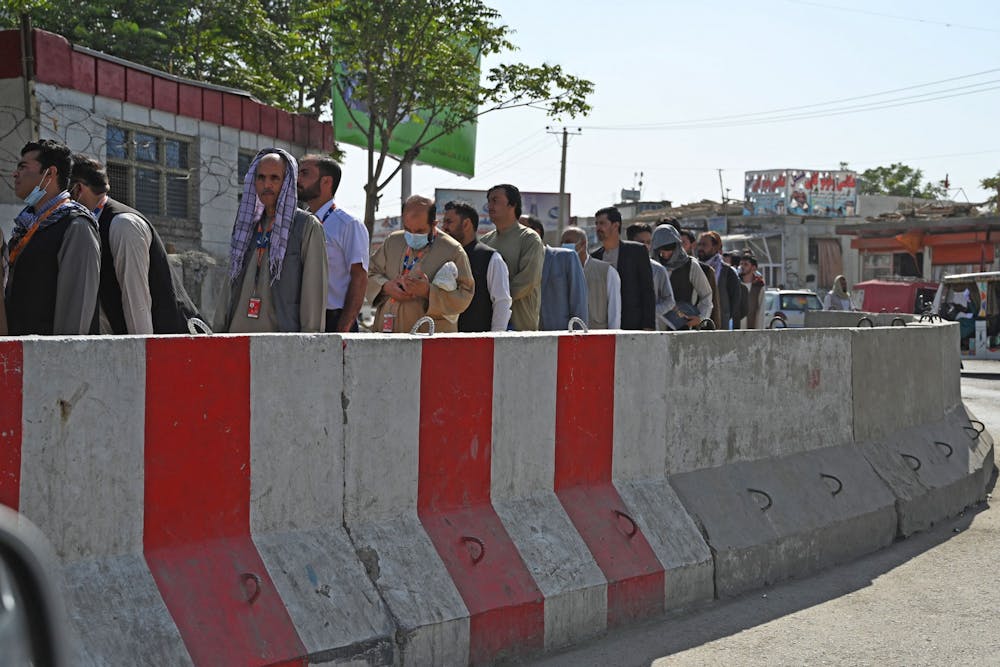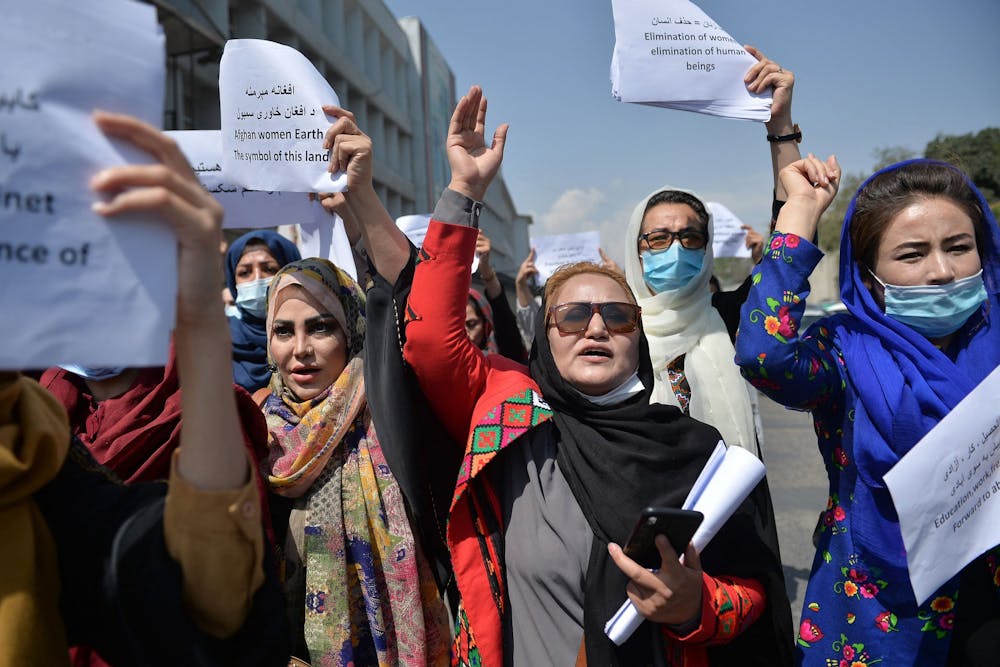Learn more about local perspectives on Afghanistan
On Sept. 9, Ball State's Peace Center will invite four panelists to discuss current issues in Afghanistan, ramifications of the current crisis, and will highlight ways for people to take action.
Larry Gerstein, director of the Center for Peace and Conflict Studies, will moderate the panel.
Panelists include:
- Muncie Mayor Dan Ridenour
- Bibi Bahrami, founder and president of Afghan Women's and Kids' Education and Necessities (AWAKEN)
- Lt. Col. James Babbitt, Ball State professor of military science
- Kenneth Holland, professor and dean at Jindal Global Law School in India
The event is scheduled for 5-6 p.m. in the Art and Journalism Building room 175. For those who cannot attend in-person, a Zoom link will be available and no prior registration is required.
For more information, follow the Ball State Center for Peace and Conflict Studies on Twitter, Facebook and Instagram.
Source: Ball State Center for Peace and Conflict Studies
When she was just 13 years old, Bibi Bahrami saw her home become a place too dangerous to live. Her friends and family had to evacuate the Behsood district of eastern Afghanistan to live as refugees in Pakistan after the Soviet invasion of Afghanistan in 1979. Bahrami witnessed death and devastation, as she lost a brother, three cousins and her grandfather.
“Eighty percent of the country was destroyed by the Soviet invasion,” she said. “I came to the U.S. in 1986 and went to school, got myself educated and had the mission to give back to those girls left behind.”
Though she didn’t know what would happen next in her family’s journey, Bahrami always thought about the people who were unable to escape Afghanistan. After moving to the United States, she started studying for her GED diploma and began to think about how she could help Afghan women and girls receive education of their own.
In 2002, Bahrami founded the nonprofit Afghan Women’s and Kids’ Education and Necessities (AWAKEN) to help people in the Behsood district of Afghanistan with primary education and healthcare needs, as well as offer financial support to students and other citizens. While living in Muncie and still in the middle of completing her associate’s degree in general arts at Ball State, Bahrami saw the early 2000s as the best time to get involved in providing education and healthcare to women and children. The United States’ defeat of the Taliban in November 2001 was an opportunity to be involved in rebuilding Afghanistan, Bahrami said.
“President [George W.] Bush, during that time, said no Taliban members were out, so after 9/11 was an opportunity during that time to have hope for a better tomorrow,” she said. “Education was a huge part of that, and it was a huge part of my mission for Afghan women — who have suffered tremendously during the Soviet invasion, the Taliban and during some other rulers. They are the ones left behind with no education to provide for their family.”
Though the Taliban was not responsible for the Sept. 11, 2001, terrorist attacks, members were accused of harboring al-Qaida’s leader, Osama bin Laden, which prompted a U.S. military invasion. NATO deployed troops to secure Kabul, Afghanistan, and surrounding areas in 2003, but the Taliban resurfaced with an increase in the number of suicide bombings in 2006.
The U.S. occupied Afghanistan until Aug. 30, 2021. This troop withdrawal deadline, which former President Donald Trump hoped would be May 1, was met under President Joe Biden. The Taliban took control of Kabul Aug. 16 and has seized power in other cities since then.
In a July 8 press conference, Biden said the U.S. military had provided Afghan military members with equipment, training and the financial support they need to sustain control of their cities. He said the Afghan military was well-equipped for self-defense against the Taliban and that U.S. withdrawal was long overdue.
“As I said in April, the United States did what we went to do in Afghanistan — to get the terrorists who attacked us on 9/11 and to deliver justice to Osama bin Laden, and to degrade the terrorist threat to keep Afghanistan from becoming a base from which attacks could be continued against the United States,” Biden said. “We achieved those objectives, that’s why we went. We did not go to Afghanistan to nation-build. It’s the right and the responsibility of the Afghan people alone to decide their future and how they want to run their country.”

Taliban members are seen Aug. 31 at the airport in Kabul, the capital of Afghanistan. U.S. President Joe Biden said between 100 and 200 Americans “with some intention to leave” remained in the war-torn country now controlled by the Taliban. Saifurahman Safi/Xinhua via ZUMA Press/TNS, Photo Courtesy
Bahrami said she is grateful to see U.S. support for Afghanistan, but there is still violence from the Taliban many people must overcome to return to their regular lives.
“There is still so much need, and people are still living in fear in Afghanistan,” Bahrami said. “Millions of Afghans have been displaced from their homes. The Taliban now have full control of the airport and are not letting people enter the airport to leave the country. Economically, Afghanistan has been dependent on foreign aid for the past 20 years, and, if this aid does not continue, millions will suffer even more.”
Amid the crisis in cities and villages across Afghanistan, Bahrami said AWAKEN is still operating its health clinic, though it has temporarily stopped its vocational training program.
“We are seeing, sometimes, more than 180 patients each day,” she said. “We’re a very small organization compared to others, but we have been able to help thousands.”
Bahrami said some women who usually work at AWAKEN’s Behsood Health Clinic didn’t want to come into work, fearing the Taliban would target them for being in public without a male relative.
“These women and children had hoped for the last 20 years, at least, that things would be better for them,” Bahrami said. “All those hopes are just gone. I want everybody to do their best to make it better for women and children. I hope God can help us and prayer can help us, but, at a human level, we owe it to those people to continue our work with education and healthcare.”
Even before the Taliban took control of Afghanistan this past month, extremist views on women’s behavior were prevalent throughout the country, said Cheri Madewell, Ball State director of instructional consultation in the Division of Online and Strategic Learning.
Madewell worked as a gender specialist as part of a grant project conducted by Ball State and Kabul University in 2016. During her time in Kabul, Madewell said women she spoke to were afraid of experiencing violence if they wished to work as professionals outside their homes.
“I spoke to young Afghan female students during my time in Afghanistan, and they expressed ongoing anxiety from being harassed walking to campus to take classes,” Madewell said via email. “For women who want to teach university courses, it is a challenge to convince the families of female teachers to allow them to instruct at the university.”
While women could legally travel by themselves and attend classes, Madewell said she spoke with women who were asked to pay bribes to receive their diplomas or enter job interviews.
“Building — and re-building — Afghanistan infrastructure is slow work,” she said. “This was the case when I was there, and, undoubtedly, it was still the case years later, to the present day. I think it’s hard to fully grasp the hoops Afghans must jump through and endure as a result of serious corruption broadly employed throughout the country.”
Bahrami estimated she receives between 30-50 phone calls every day from people who work with AWAKEN. They give her updates on what is happening under Taliban rule, ask her for personal help applying for U.S. visas and share their fears while they still hope to help women and children.
“In other parts of the country, Afghans associated with the U.S. or with the previous government have been targeted, and some [have been] killed,” Bahrami said. “We hope and pray that all violence against Afghans stops, whether it’s from the U.S. or from the Taliban, and that we can continue to provide aid through [non-governmental organizations] like AWAKEN.”
Though she is doing her best to help her family and friends apply for visas, Bahrami said, application reviews are experiencing a backlog. Even some who are U.S. citizens are unable to leave the country.
“My husband — he’s a citizen — and he went to the airport two or three times and was kicked out,” Bahrami said. “He was supposed to be here [in Muncie] — we have a family wedding, and he is not able to come back. He went through so much difficulty, and it’s such an unfortunate situation.”
Multiple people fell to their deaths near the Kabul airport Aug. 16 after holding onto the wings of military jets as the U.S. evacuated some troops. Witnesses told The Associated Press hundreds of people were trapped in the Kabul airport, with U.S. military attempting to clear the airport and the Taliban attempting to keep people inside. More recently, the Taliban halted the takeoff of four planes at the Mazar-e-Sharif airport after promising to let people with proper passports and paperwork leave the country.

Airport workers stand in a queue at a checkpoint Sept. 4 before entering the Kabul International Airport in Kabul. The Associated Press reported hundreds of people were trapped in the Kabul airport while U.S. military were evacuating the country. Aamir Qureshi/AFP via Getty Images/TNS, Photo Courtesy
“The Taliban has said they will work with people and let them go back to work [and] get an education, and I hope and pray that they will follow that,” Bahrami said. “I hope for a better tomorrow always, but people are very scared.”
Larry Gerstein, director of Ball State’s Center of Peace and Conflict Studies, said he is most concerned for the safety of community organization leaders in Afghanistan, including employees of U.S.-led educational institutions.
“Additionally, I am extremely concerned about educated and professionally successful women and girls,” he said via email, “and females that gained some degree of independence and power prior to the U.S. leaving.”
Gerstein said he is skeptical of the Taliban’s promises they will restore the rights of women gained before the group took control of the country.
“I also think the Taliban will be faced with many challenges from the outside if they completely suppress women and girls and the entire population,” Gerstein said. “Afghanistan will be isolated from almost all of the world powers, and the Taliban will struggle to meet the basic needs of the Afghan people.”
While the U.S. invested significant money, time and lives into the Afghanistan War, Gerstein said he doesn’t think it was all wasted. He said he respects members of the military for planting seeds for a better future for Afghanistan and thinks positive relationships between Afghanistan citizens and U.S. military were formed during the past two decades.
“I hope that channels of communication will remain open between the Taliban and the U.S,” Gerstein said. “I also hope that the U.S., including Indiana and Muncie, will strongly and openly support the Afghan people and provide them with opportunities to relocate here, become gainfully employed, affiliated with our educational institutions — including Ball State — and assist them in establishing productive and happy lives.”
Current life throughout Afghanistan is still chaotic, Bahrami said, as people are unsure of what the Taliban will do next and where to find the safest spots for shelter. She is also scared for the future but hopes AWAKEN can continue its work amid Taliban rule.
“I’m a very positive person, and I still hope that the Taliban learns from their previous record that people are so afraid of what they did to people that they are scared to go out of their houses,” Bahrami said. “I hope and pray that they will take care of these human beings … The solution is not getting rid of certain groups but to respect and understand each other.”
Contact Grace McCormick with comments at grmccormick@bsu.edu or on Twitter @graceMc564.





